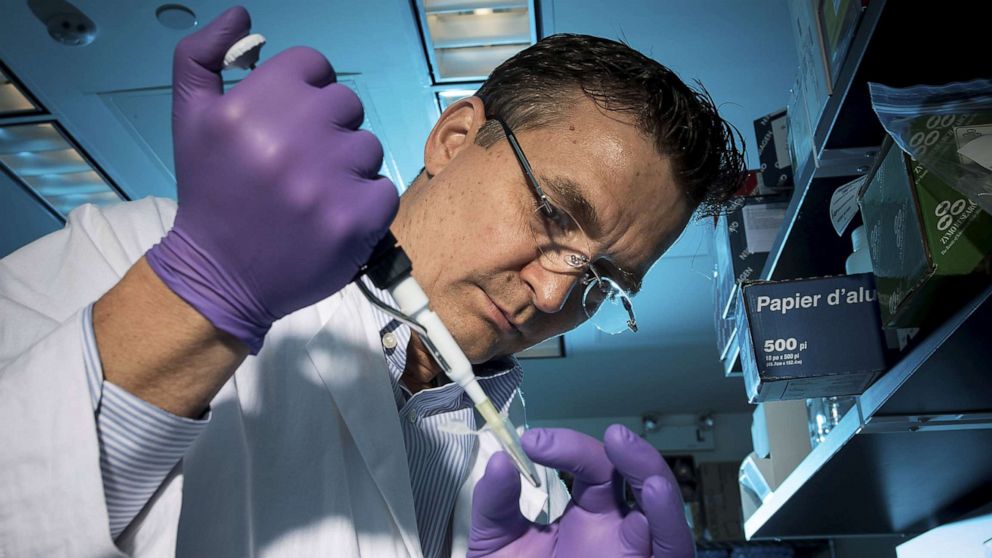LONDON – Testing began in London for the next generation of COVID-19 vaccines with the first dose of a new nasal vaccine being developed by the American company Codagenix having been administered in a quarantine facility in London, it was announced Monday morning. .
“This vaccine is one of the first next generation COVID-19 vaccines, it is a live, attenuated, single-needle, needle-free, intranasal vaccine.” Cathal Friel, executive chairman of Open Orphan, the company responsible for testing, said in a statement.
To reach the finish line, the vaccine will need to prove that it is safe and effective in three experimental ‘phases’ – a process that can take many months.
But this vaccine, called COVI-VAC, is different from the vaccines currently available on the market. It uses a “weakened, naturally occurring form of the virus that does not cause disease, but generates a strong immune response,” explains Codagenix CEO Robert Coleman, PHD. “Historically, live attenuated vaccines have been very effective, providing broad and long-lasting immunity and usually counting on a single dose.”
Meanwhile, Coleman said, “current mRNA, VLP and adenovirus-based vaccines target only the Spike protein, limiting the range of antibodies that can be produced.”
And as Sybil Tasker, MD, MPH, Codagenix’s Chief Medical Officer notes, COVI-VAC could be more effective in combating mutant strains of the virus that may arise in the future, “As a live attenuated vaccine, COVI-VAC has the potential to provide a broader immune response compared to other COVID-19 vaccines that target only a portion of the virus, which may prove critical as new variants of SARS-CoV-2 begin to emerge. ”
COVI-VAC was developed using an algorithm that essentially recodes viral genes, explains Coleman, “to cause the slow and inefficient translation of viral genes in the human cell in a process that Codagenix refers to as“ de-optimization ”.
“We put the sequence of the target virus in our algorithm and the software digitally de-optimizes the viral gene. Then we synthesize the corresponding DNA and exchange or sew it into the virus’s natural genome. This process essentially converts the natural virus from enemy to friend – making it harmless, but capable of generating a broad immune response. “
Using a live attenuated virus in a vaccine is nothing new. “Most vaccines that we receive as children are called live attenuated vaccines. That is, they can cause an infection, but they do it so weakly that there is no danger of infection, but immunity is generated in the same way as for the normal virus, ”said Ian Jones, professor of virology at Reading University.
“The main problem with this approach is that, historically, making the strain weakened took a lot of trial and error. This new approach makes tension lessened in one step. “
Since the Codagenix vaccine uses a weakened form of live virus, there is a small chance that volunteers will transmit the virus in the community or even suffer from some disease. To mitigate these potential risks, tests are being conducted in a secure quarantine facility in East London.
“It’s an extra level of caution,” Andrew Catchpole, the scientific director responsible for the tests, told ABC News, adding that “there are no regulatory requirements for the vaccine to be tested in a quarantine facility.”
Catchpole is the scientific director of hVIVO and is also expected to head the team that will conduct the first human challenge tests for a COVID-19 vaccine.
“Codagenix looked for an inpatient unit with experience with live vaccines and viruses and a local laboratory for the first human assessment of COVI-VAC to allow a complete assessment of product safety and voluntary monitoring in real time,” said Coleman.
The first small group of healthy young adult volunteers will receive the dose, placing it on their nose, and then they will be closely monitored and tested regularly. The assay will follow a standard dose escalation methodology.
“The first phase of this study is expected to provide evidence to support this expectation of a short duration of virus elimination, as well as demonstrating that the vaccine virus is in fact very weak and does not cause disease,” Catchpole told ABC News.
Unlike vaccines that have been authorized, Codagenix believes that its vaccine can provide long-term immunity against COVID-19, with only one or two doses required over a lifetime, similar to MMR or chickenpox vaccines.
“Most live attenuated vaccines by design cannot completely replicate viruses, this vaccine is different because it can. Being able to do this maximizes the immune response and makes immune protection as natural as possible, as if the person were exposed to the real virus, ”added Catchpole.
But it is still the beginning, with the obstacles of more phases of clinical tests ahead, “this study will facilitate the vaccine, then move on to phase 2 of efficacy and immunogenicity tests of clinical studies”, explains Catchpole.
However, Codagenix is confident and has worked on what it calls the “speed of light” to reach this stage and has partnered with the world’s largest vaccine producer, the Serum Institute of India.
“As soon as it became clear that the SARS-CoV-2 outbreak was about to become a global problem, our scientists took action to generate a live attenuated vaccine against COVID-19. Codagenix and our global partner, Serum Institute of India, are committed to addressing the unmet need for protection against COVID-19, especially in low-income countries around the world. “
Coleman hopes that the simplicity with which this vaccine can be administered – simply by squirting it into someone’s nose – combined with the ease of its production and transport will make it an important player in the worldwide fight against COVID-19.
But Jones warns that there is still a long way to go, “they are far behind current vaccines, so it is unclear whether they will get anywhere fast enough to make a contribution.”
